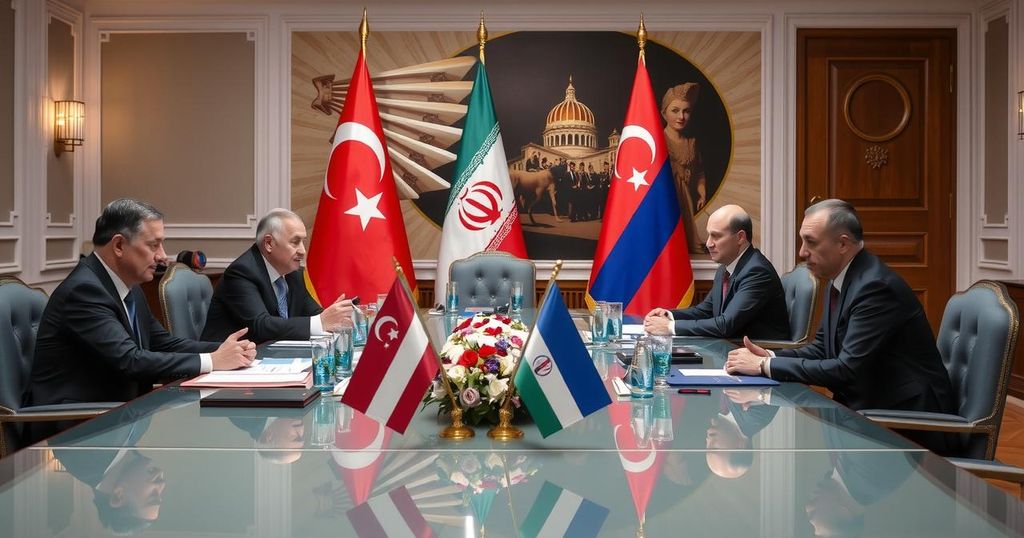World news
ABBAS ARAGHCHI, ALEPPO, ARAGHCHI, ASIA, BASHAR AL - ASSAD, DIPLOMACY, EUROPE/ASIA, FIGHTER JETS, HAYAT TA, HAYAT TAHRIR AL - SHAM, IRAN, MIDDLE EAST, NATIONAL ARMY, QATAR, REC, RUSSIA, SANCTIONS, SERGEI LAVROV, SYRIA, SYRIAN CONFLICT, SYRIAN NATIONAL ARMY, WAR, YPG
Oliver Grayson
0 Comments
Türkiye, Iran, and Russia Engage in Diplomatic Talks on Syria in Doha
Türkiye, Iran, and Russia’s foreign ministers met in Doha to address Syria’s ongoing conflict, focusing on initiating political dialogue amid an escalation of anti-regime offensives. The discussions arose in light of recent territorial gains by opposition forces and regional security concerns, particularly regarding their implications for neighboring countries.
On December 7, 2024, the top diplomats from Türkiye, Iran, and Russia convened in Doha for discussions regarding the ongoing conflict in Syria amidst a newly escalated offensive by anti-regime forces. Turkish Foreign Minister Hakan Fidan, Iranian Foreign Minister Abbas Araghchi, and Russian Foreign Minister Sergey Lavrov explored avenues for establishing a political dialogue between the Syrian government and opposition groups recognized as legitimate.
Since 2017, these three nations have actively engaged in the Astana format discussions aimed at achieving a political resolution to the conflict; however, recent developments indicate significant territorial gains by opposition factions, particularly targeting areas around Damascus. Following the assembly, Araghchi remarked on the necessity for direct discussions, highlighting a prior dialogue with his Turkish counterpart and Qatar’s Emir.
In a recent statement, Turkish President Recep Tayyip Erdoğan expressed hopes for the continuation of the anti-regime offensive, with the capital’s encirclement described as a primary objective. The backdrop to these discussions includes Qatar’s previous support for opposition factions and its current position advocating for negotiated peace following years of civil unrest. Furthermore, the aggressive counteroffensive initiated by Hayat Tahrir al-Sham (HTS) has led to rapid territorial advances in significant locations such as Aleppo and Hama.
Moreover, concerns regarding regional stability were echoed by Araghchi, emphasizing that the conflict’s ramifications extend beyond Syria, threatening neighboring nations including Iraq, Jordan, and Türkiye.
The situation in Syria has been complex and evolving since the onset of the civil war in 2011, when protests against President Bashar al-Assad escalated into armed conflict. Various international and local factions have significantly influenced the dynamics of this conflict, including Iran’s backing of the Assad regime and support for various opposition groups. The Astana format—comprising Türkiye, Iran, and Russia—was established to facilitate a political settlement and peace negotiations in Syria, amidst growing divisions and power struggles among domestic groups. Recently, the conflict has intensified with opposition forces gaining substantial ground via a well-organized counteroffensive, particularly against the backdrop of long-standing divisions within the region and evolving stances from international stakeholders, including Qatar, which has shifted its position towards advocating a peaceful resolution.
In summary, the recent meeting in Doha between the foreign ministers of Türkiye, Iran, and Russia highlights the urgent need for political dialogue in light of the rapidly changing landscape in Syria marked by aggressive opposition offensives. The historical context provided by the Astana process frames these discussions, while regional implications underscore the significance of collective diplomacy among these nations. The outcomes of these negotiations could potentially alter the trajectory of the conflict and impact broader stability within the Middle East.
Original Source: www.hurriyetdailynews.com




Post Comment